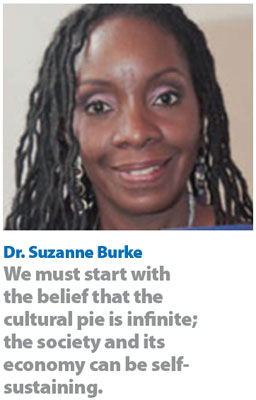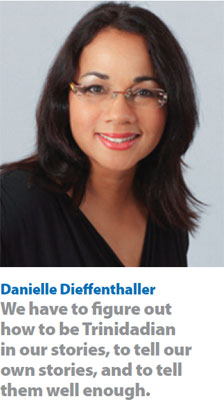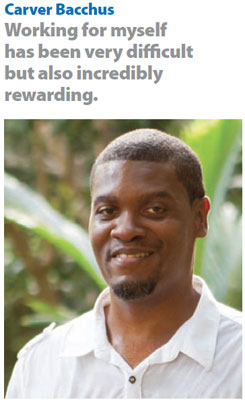

Culture means many things to different people; and is discernible in art and creative expressions, manifesting who we are – as Trinbagonians – in the world. Dr. Suzanne Burke, lecturer in Cultural Studies at the UWI St Augustine, provides the philosophical framework to support a Trinidad and Tobago creative industry. Danielle Dieffenthaller, film-maker, and Carver Bacchus, environmental communicator, demonstrate pathways to sustainable creative businesses.
THE CASE FOR CULTURE
 “There are many examples of young creative entrepreneurs who are approaching their craft in smarter, more strategic ways. Just look at the winner of this year’s International Soca Monarch. Aaron ‘Voice’ St. Louis is a third year student at UWI in the Theatre Unit of the Department of Creative and Festival Arts (DCFA). St. Louis is part of the writing collective known as Full Blown Entertainment which has penned the last five Soca Monarch winning songs. In 2014 he co-wrote the winning Groovy Soca song Too Real for Kerwin Dubois. “There are many examples of young creative entrepreneurs who are approaching their craft in smarter, more strategic ways. Just look at the winner of this year’s International Soca Monarch. Aaron ‘Voice’ St. Louis is a third year student at UWI in the Theatre Unit of the Department of Creative and Festival Arts (DCFA). St. Louis is part of the writing collective known as Full Blown Entertainment which has penned the last five Soca Monarch winning songs. In 2014 he co-wrote the winning Groovy Soca song Too Real for Kerwin Dubois.
“Another student, Keegan Taylor, who is completing his MA in Cultural Studies wrote this year’s Road March Waiting on the Stage for Machel Montano as part of the four-man collective Badjohn Republic. This idea of collaboration is fundamental to how culture works, and how our creative industries can develop.”
Suzanne Burke, Lecturer in Cultural Studies at the UWI’s Literary, Cultural and Communication Studies Department St. Augustine, believes that developing the intrinsic and instrumental values of culture are equally important. She is clear that strategies for sustainable creative enterprises need to be mounted: an enabling policy environment; adequate resourcing of the institutions of support; education and training in the core creative arts and supporting systems; and incentivizing investment in the sector.
“So there’s the challenge: to make sure that culture is integrated with development so that cultural awareness and sensitivity are evident throughout the society. We have to address our disjointed approach to culture. In every area, culture needs to be mainstreamed; to be acknowledged and integrated in policy.”
Burke had an epiphany when she was Regional Manager (East) for the YTEPP programme – to train and employ young people – in the early 1990s.
“I saw the response of young people to courses in the performing arts. They were discovering who they were in the world. They were empowered; they developed self-confidence; they learned life skills.”
Later on, she went on to her Master’s thesis at the Institute of Social Studies, The Hague, Netherlands, entitled ‘Cultural Industries and Economic Development: The case of the Carnival Sector in Trinidad & Tobago.’
She returned and picked up the post of General Manager at the Entertainment and Industrial Development Company (EIDECO), an umbrella organization affiliated with TIDCO aimed at developing the entertainment sector: “It failed fabulously.” Figuring out why it failed led to her deep investigations on cultural policy; and the PhD from the University of Essex.
In a 2011 presentation on Treatment of the Arts in Multicultural Policy, she proposes “convergence across various policy areas and sectors” including: community development; education and training; trade and industry; economics and finance; media and broadcast; tourism and urban development.
More recently, in the 2014 Cultural Mapping Exercise that she conducted for the Ministry of Culture, she collected evidence that revealed that the arts and cultural industry sector includes enterprises that have a variety of business models, governance systems, employment patterns, motivations and are at different stages of business development. The study underscored the need for a co-ordinated approach to the sector’s development.
Convergence and connecting will build the framework, she believes, for eventual critical and commercial success. “In government, there should be an Inter-Ministerial Committee or a similar mechanism to coordinate policy and programming action in the cultural and creative industries.”
Unusual and individual instances – like this year’s winners for the International Soca Monarch and Road March; Bunji Garlin’s acclaim as part of the vocal team for Diplo & Skrillex’s award-winning album, Jack Ü - prove that Trinbagonians have the talent. Some of what Burke calls “the creative ecosystem” may be in place, but the whole fabric is still to be developed.
She sees a role for The UWI in gathering the evidence to demonstrate the pathways to success; even as she acknowledges how difficult it is to teach, to supervise and to research.
In her parting shot, she looks at the Carnival. She played mas with Minshall for 13 years, and more recently with K2K. “It can’t only be about turning a profit,” she says. “Smart enterprises understand that cultural goods and services are implicated in the construction of identity, the promotion of diversity and the encouragement of social cohesion. Strategic policy understands that it is involved in maintaining equilibrium between the social and economic aspects of culture.
“We must start with the belief that the cultural pie is infinite; the society and its economy can be self-sustaining. We must say no to the tyranny of the ‘either/or’ and embrace the power of the ‘and’ if we are to move towards a more disciplined and deliberate activation of the culture to a creative industry in the service of our overall development and well-being.”
THE FILM PRODUCER
 In 2010, Danielle Dieffenthaller was guest lecturer in the Film Department at The UWI. Her seminar, intended for third-year students, was titled The Film Producer. She brought experience and insight garnered over 20 years of being a producer (director, script-writer, negotiator, distributor and financial director) to the classroom. In 2010, Danielle Dieffenthaller was guest lecturer in the Film Department at The UWI. Her seminar, intended for third-year students, was titled The Film Producer. She brought experience and insight garnered over 20 years of being a producer (director, script-writer, negotiator, distributor and financial director) to the classroom.
Her most important lessons were practical insights into working in Trinidad and Tobago. She says she returned to Trinidad in 1990 technically adept (Bachelor of Applied Art, Radio & Television Arts, Ryerson Polytechnic University, Toronto, Canada) and then had to re-learn to adapt – “we make it happen” – in the Trinidad arts and business environment.
“It’s very important to be able to speak the language of business in Trinidad, to be business savvy, not just an artist.
“A lot of people jump in to film with no thought about making back some money. To some extent, I jumped in to see how Westwood Park would go. That series went on for six seasons, and in each season, we tightened and improved.
“You realize that you might be on the way to having a sustainable business – building an industry. But you cannot do it alone. Government supports are essential. The sectors that are important to a film industry – tourism, trade, culture, technology, community development and education – are oceans apart. Forward-thinking businesspersons must understand the opportunities for investment. Corporate Trinidad and government ministries need to understand each other, need to talk with each other.”
In 1990, Dieffenthaller and her colleague Walt Lovelace, working with Banyan Limited, filmed the release of hostages and surrender of the Muslimeen at TTT. This marked an initiation into Trinidadian media, history and filmmaking. Subsequently as CEO, producer, writer, editor of her own company Earth TV (1991-2006) she produced the Ecowatch series and the impressive Westwood Park series. Westwood Park ran for six seasons – 100 half-hour segments – the longest running, most widely viewed indigenous drama series in the history of Trinidad and Tobago television.
“We have stories that are ours. We need to be ourselves, to be genuine. We have to figure out how to be Trinidadian in our stories, to tell our own stories, and to tell them well enough,” says Dieffenthaller who has also produced memorable music videos, documentaries, commercials and corporate videos. In 2013, she received an award from the Trinidad and Tobago Film Festival celebrating pioneering work in filmmaking.
In 2007, she produced The Reef, a 13-part half-hour series set in Tobago. Later this year, she expects to start production on a crime drama series, Plain Sight. According to the blurb, the new series revolves around two characters who grew up in the same community. One becomes a drug lord and the other a forensic detective, both operating on their Caribbean island where “danger lurks just beneath the surface and criminals hide in Plain Sight.”
As guest lecturer at the film school, she shared the experience of 20+ years dedicated to her craft; including these guidelines:
- Don’t do this for money or fame.
- Look for financing up front; consider distribution possibilities.
- Your budgets will dictate everything: people, time, locations
- Plan each project as much as possible: pre-production is most important. Take time to get the right people around.
- Find your market: who are you making this film for? Who will be interested?
- Consider investors; and include a plan to pay back the investment; never assume that you are being given a grant.
- What is your product? We have to start viewing our films as products.
- Hire the right crew, not just your friends. Feed your crew and build a team.
- Make sure everybody on your project is on the same page: everyone must understand the vision for the film. Take time to ensure that everyone knows what everyone else is doing.
- Select locations that are practical for everyone: visual, sound, cast, crew.
- Be honest about time and resources.
Dieffenthaller has learned that honesty about what she can afford to pay is the best policy. She tells the story of finding the main location for The Reef in Tobago. “You knock on the door and find the perfect location. But you have to say that $X is what you can afford to pay for a month in the man’s house. It was not a lot for a place that goes for a couple thousand US$ per night. But he looked at me, and said ‘ok’. Sometimes you do get lucky!”
A BETTER PLACE
 In November 2015, the Green Screen – Environmental Film series, opened its annual event with a feature film based on the work in five communities towards sustainable development. A Better Place spotlights persons in Trinidad and Tobago whose projects for survival and sustainability might otherwise go unnoticed. The film is joyous and optimistic in its vision of the natural land and sea scapes, as well as the passion for life of ordinary and challenged Trinbagonians. The lasting impression from A Better Place is resilience, creativity and hope. Yes, we can build a better Trinidad and Tobago! In November 2015, the Green Screen – Environmental Film series, opened its annual event with a feature film based on the work in five communities towards sustainable development. A Better Place spotlights persons in Trinidad and Tobago whose projects for survival and sustainability might otherwise go unnoticed. The film is joyous and optimistic in its vision of the natural land and sea scapes, as well as the passion for life of ordinary and challenged Trinbagonians. The lasting impression from A Better Place is resilience, creativity and hope. Yes, we can build a better Trinidad and Tobago!
The film is the latest production by Carver Bacchus of Sustain T&T which is an organization focused on environmental and sustainability education in Trinidad and Tobago. Since 2011, the organization has developed and implemented programmes to mainstream environmental issues - in particular climate change - towards action. The Green Screen – Environmental Film series was launched with that mission; and because Trinidadians are easily engaged by this medium.
“From my perspective the creative industries are an important component of diversification. So we are sitting at the crossroads between the creative sector, sustainability and design. Sustain T&T is creating a platform for education, information sharing, and social marketing of behaviours that are necessary to maintain our environment while diversifying our economy,” says Bacchus.
With a BSc in Communications from the Florida Institute of Technology (1996), it had taken another ten years to crystallise his personal vision and the focus of his work in Trinidad and Tobago. The time spent in merchandising, in marketing, in sales and communications, in private businesses and in public sector institutions, provided the bedrock for engaging with communities in all walks of life. The Diploma in Motion Picture Directing from the Brighton Film School, UK, (2008) was an important stepping stone.
“One of our core messages is economic sustainability and diversification for long term survival in T&T,” says Bacchus.
“Sustainability is about how people live and interact with their homes, places of work, school, communities and each other. What people want for themselves and where they see themselves in the future must be at the centre of planning. People have to be engaged with this process and care enough to make their voices be heard. It is Sustain T&T's job to make them care.” He knows he cannot do it alone: environmental issues affect everyone, the nation, the world; collaboration is essential.
“I am working to develop and formalise a network of creative hubs to support the expansion and legitimisation of our creative sector. Sustain T&T operates out of a creative co-working space called Home, a partnership between Anya Ayoung Chee and Abovegroup. Home provides a space where creatives can meet, work, collaborate and exchange, but there are many similar spaces, at different levels of development, all over Trinidad and Tobago. My goal is to bring them together and coordinate a series of ongoing programmes to facilitate creative exchange, training, capacity building and development, ultimately positioning Trinidad as the creative industry hub of the region. Sustain T&T has already designed an extensive proposal for developing the hub network.”
Bacchus concludes, “Working for myself has been very difficult but also incredibly rewarding. I have had to be very patient but now I am seeing some fruits. The best part is that I am doing exactly what I want to be doing – creating media content and experiences for the purposes of social awareness and behaviour change.”
–Pat Ganase is a freelance writer and editor. |





